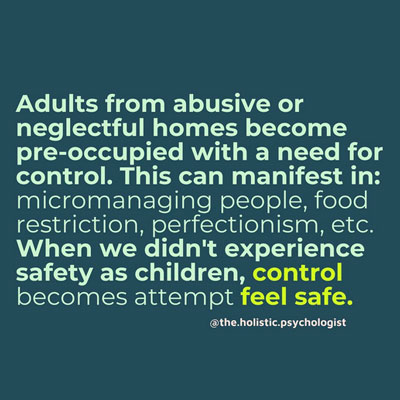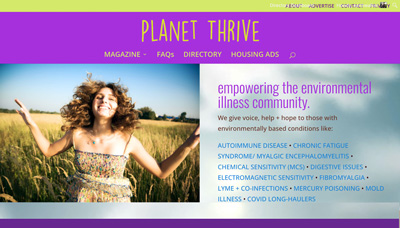
Dr. Nicole LaPera shares deep wisdom daily on her Instagram page: the.holistic.psychologist. She writes about issues that may challenge us as adults from being parented by flawed people who did the best they could with the knowledge and emotional capacity they had available to them.
I’m loving her perspective on control, and how it can often be an attempt to feel safe in our bodies and our lives. I resonate with this as someone who has had to take great control over what I eat, due to digestive disease and coupled with severe and extensive food sensitivities. As a chemically and electromagnetically sensitive person, I also have to control my environments, to some degree. I’m working at evaluating how much of my controlling behavior is trauma based and overly protective, and perhaps no longer needed. I constantly adjust my boundaries as I discover I can do more in my life and still be safe. It’s a very nuanced dance, and to be honest, it feels very uncomfortable to me. Giving up control after years of life-threatening and extremely harrowing circumstances is not easy. But I also recognize that the more safe I can feel in my body and life, and the more I can release, the happier I will be. I feel thankful to have discovered Dr. LaPera, and I wanted to share her work with you. Though she focuses on childhood trauma and experiences, I find that with chronic disabling illness, we can develop similar patterns as adults. I find a lot of resonance in her explanations and look forward to reading her posts each day.
“Controlling behaviors are safety seeking behaviors.
When we don’t feel safe or able to cope, we can enter a state of hypervigilance.
Unconsciously, our nervous system and brain uses control as a way to say:
– “I can’t let anything I cannot predict happen, it left me hurt in the past.”
– “I must control everything around me, that’s how I stay safe.”
Internally, many of us are still that little child hiding in our room, feeling helpless.
And what do children who once felt helpless on a regular basis become as adults: “control freaks” or perfectionists.
It’s our body attempting to protect us.
The work is learning how to create safety in our body.
Learning how to create clear boundaries (few of us had these in childhood), how to regulate our emotions, and how to notice when we’re going into controlling autopilot.
This is when we can ask: what need can I meet for myself? Or how can I move my body to disengage from this cycle?”
– Dr. Nicole LaPera, @the.holistic.psychologist










0 Comments